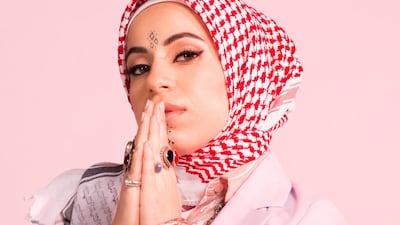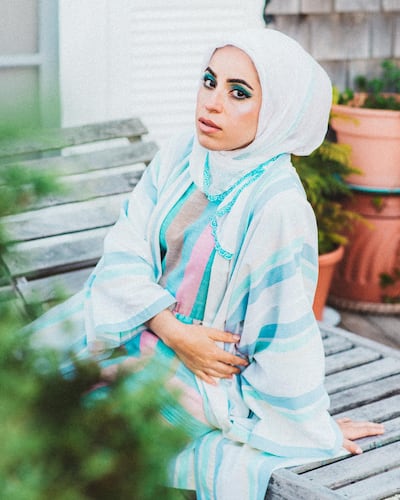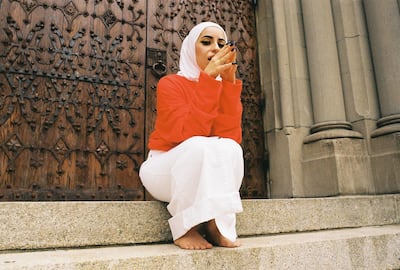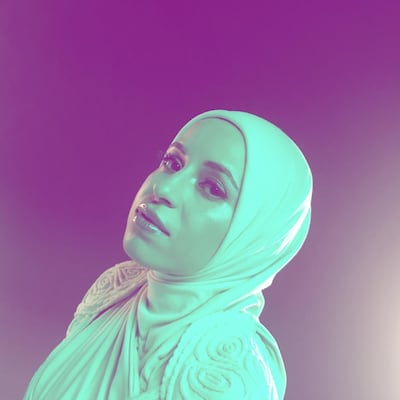Since she first stormed the music scene in 2017, Mona Haydar has become an outspoken role model for young Muslim women.
The American-Syrian rapper's music video for her protest anthem, Hijabi (Wrap my Hijab), went viral for powerfully challenging misconceptions about veiled women around the world. Haydar has since made a name for herself as not only a talented female rapper, but one who isn't afraid to unapologetically stand up for what she believes in.
And yes, religion does play a prominent role in her tracks. "For me, my songs are prayers. They are ways I'm talking to my God, they are ways that I'm talking to my peers," Haydar tells The National. "They are ways I hope the world can become a more beautiful and loving place for all of us."
You may be familiar with Haydar, 31, from her 2018 single Barbarian, in which she boldly addressed the common perception that Muslim women are oppressed. Or perhaps you listened to her criticise the Muslim world's often hypocritical mentalities in her song, Dog.
Irrespective, if you've come into contact with Haydar's resistance music, it's likely that she's made a lasting impression.
Haydar made a splash primarily through YouTube and an online following, without all the bells and whistles that usually come with being a globally recognised singer. After her 2017 debut hit on YouTube, Haydar released her first EP independently, Barbarican, and other singles on Apple Music and Spotify.
With hard-hitting lyrics that are often politically nuanced, powerful vocals and a defiant attitude, Haydar forces listeners to address difficult conversations, from Islamophobia to unrealistic beauty standards. She hopes to "help people heal" from societal pressures and dealing with trauma.
A mother of two boys, Haydar lives a "pretty normal life," at least, when she's not on tour or public speaking. Prior to her involvement in music, in 2015, she and her husband, Sebastian, ran a project called "Ask a Muslim," which invited open conversation about religion and faith. She was also featured on Microsoft's campaign #SpreadHarmony in 2016. More recently, Haydar performed and spoke at the Spiritual Directors International Conference in the US, and performed a show in Amsterdam.
Haydar was born in Saudi Arabia, but moved to the US when she was young, and grew up in Flint, Michigan. She spent a small stint of her university years in Damascus, but it was in Michigan where her interest in rap flourished.
Haydar's career began when she was 14 years old, in downtown Flint, where she performed traditional Arabic poetry at open mic nights. Mentored by the African-American community there, to whom she is highly grateful, she learnt to use her voice to tell her story in a way that was simultaneously fun and meaningful.
"I curated my voice downtown, in a space that taught me how to be authentically myself without giving up part of my identity as an Arab Muslim woman," Haydar recalls. Hip-hop also started to became a prominent part of her upbringing, and she always joked that she "would be a rapper someday".
Haydar evolved from poetry to rap as she sought to reach a bigger audience.
She also began drawing from personal experiences in her lyrics, while balancing political dialogue, as well as addressing contentious issues.
Now, Haydar uses her platform to promote equality and cultural awareness through rap, discussing everything from religion to gender to sexuality. She is inspired by a wide range of artists, and boasts an eclectic taste in music.
Artists such as Umm Kulthum, The Black Keys and James Blake appear on her personal playlist. This diversity is reflected in her own songs, with unique beats intertwined in English and Arabic pop, which you can't help but play on repeat.
Haydar is also completely hands-on with her creative production; rapping, directing and producing several of her music videos, including her most recent single, Good Body, released last week. Haydar laughs as she recalls the process for that music video, for which she initially had more than 17 different concepts to consider.
And while she loves collaboration, she also isn't afraid to trust her gut. "Ultimately, the more I trust myself as an artist, and the more confidence I have in myself, the better I do and the clearer my messages are," she says. "I believe that being vulnerable as an artist is the only authentic way of truly creating. The more vulnerable I am as an artist, the better my music will be, and the more impactful it will be."
Haydar's music is especially geared towards the youth, in the hopes of inspiring cultural shifts and the creation of a more accepting society.
While plenty of feedback on her music has lauded her as brave and inspiring, Haydar has her detractors. She has been labelled a "shaytana" (devil) and "too out there".
Perhaps most challenging for Haydar, though, is the knowledge that many Muslims do not support her outspokenness.
"When Dog came out, people, especially Muslims and Arabs, got mad at me, particularly at my use of the word 'Sheikh'. I understand why they were upset, but at the same time … I did it with a lot of prayer and a lot of intention. I prayed Istikhara before I did it, the prayer for guidance." And so, for the rapper, Islam and music go hand in hand.
It has meant that Haydar has become an empowering figure for young Arab Muslim girls. Fans who come from conservative backgrounds frequently ask how she broke out of the mould that restrains them, asking how they, too, can voice their own opinions publicly, which is often considered "Aeib" (shameful).
To this, she says finding her own independence came from visiting her ancestral home. Her brief years in Syria revolved around discovering her identity after so long growing up in diaspora. "And what that means is I can connect to my purpose," Haydar says. "So when I connected to my tribal identity as somebody from the Levant, I could really break out, because I knew exactly who I was and where I came from."
As a second-generation immigrant, Haydar's focus is not on survival, like her parents, who first immigrated to the US in 1971, but rather on following her passions. A lot of her work is, as a result, about showing people they don't have to live based on anyone's rules; particularly, as she says, because "as an Arab Muslim woman, who we're allowed to be is very much based on a colonial model".
Haydar's career took off as she was a rarity in mainstream US music: a Muslim woman who raps and isn't afraid to say what she thinks. Through the years, her music has changed and adapted, but she is quick to provide reassurances that she isn't moving away from this central theme. However, she is now challenging herself as an artist to expand into newer, global themes, such as climate change, self-love and self-actualisation.
And she isn't only looking to unite her Muslim fan base. She wants to champion minorities worldwide. "You can turn the world upside down trying to get your own freedom, but other people are not free. It all impacts us. All of our liberation is connected," she says.
“Your religion doesn’t matter when you’re talking about self-actualisation. Your culture, race, gender and sexuality don’t matter when talking about healing trauma. None of that matters.”




